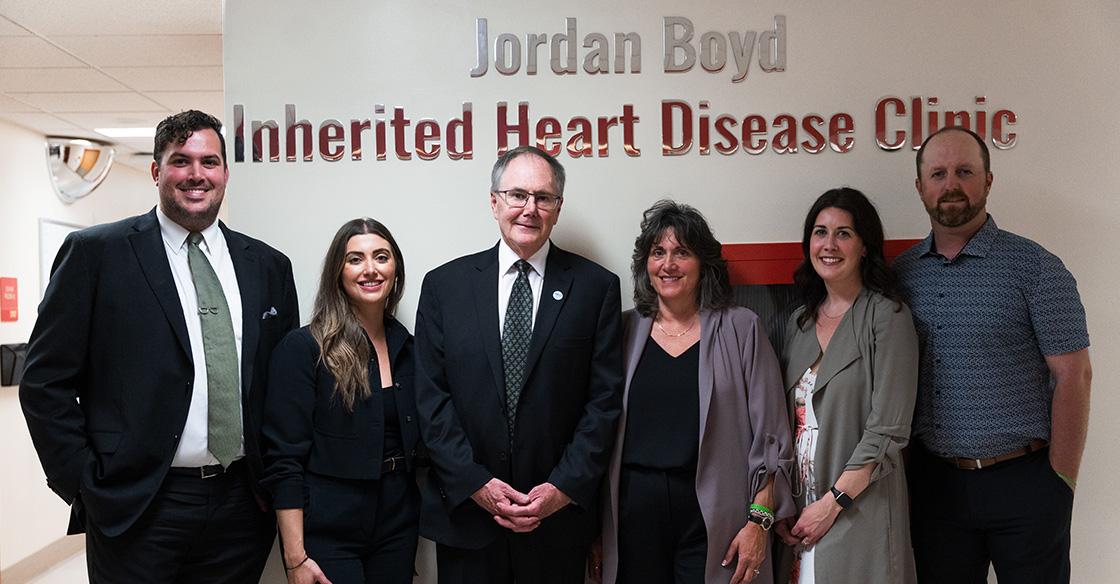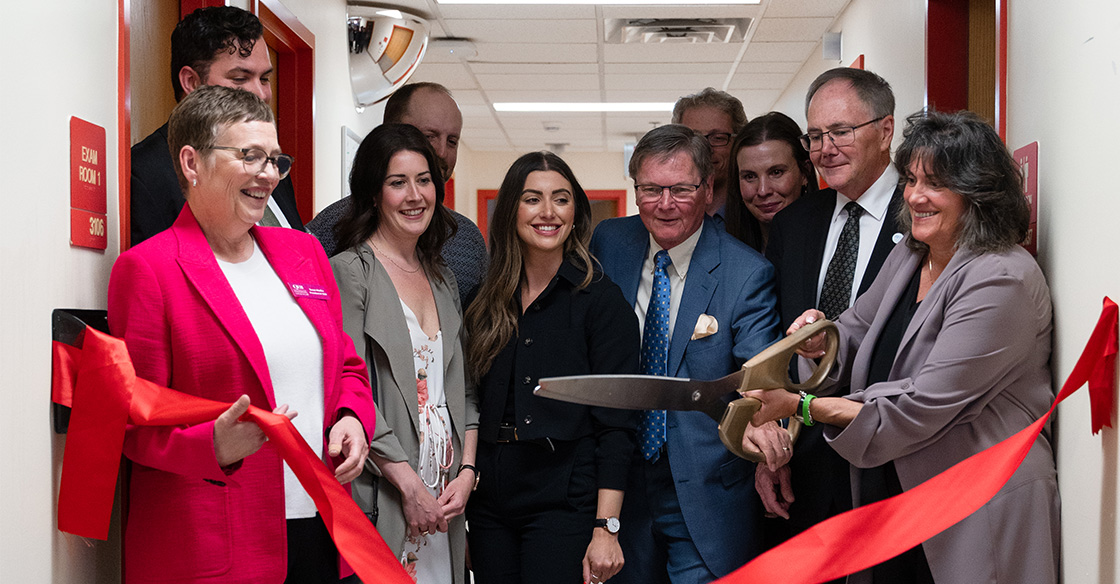
Pictured: Members of Jordan Boyd's family at the 2024 unveiling of the QEII's Jordan Boyd Inherited Heart Disease Clinic
Friday, May 23 wasn’t an ordinary day inside the QEII’s Jordan Boyd Inherited Heart Disease Clinic. It marked a powerful and emotional milestone — one year since the clinic was renamed in Jordan’s memory, and what would have been the late teen hockey player’s 28th birthday.
“It’s a very important day for all of us here at the clinic and for the Boyd family,” says Dr. Ciorsti MacIntyre, a genetic cardiologist and the clinic’s director. “We can’t thank them enough for turning something so tragic into a movement that’s changing and saving lives.”
In the year since its renaming, the Jordan Boyd Inherited Heart Disease Clinic has seen more than 500 patients. Many of them are people like Jordan — seemingly healthy, active individuals who may carry rare genetic heart conditions that can trigger sudden cardiac arrest without warning. In some cases, these patients are members of Jordan’s own family.
FROM TRAGEDY TO TRANSFORMATION
Jordan Boyd was just 16 when he collapsed and died on the ice during a hockey training camp in 2013. The cause: arrhythmogenic right ventricular cardiomyopathy (ARVC), a rare, inherited heart condition that had gone undetected.
In the months following Jordan’s tragic passing, the Boyd family’s world shifted once more. Genetic testing revealed that the heart condition that claimed Jordan’s life was present in other members of the family. Most significantly, it was determined that the gene was active in Jordan’s mother, Debbie, putting her at serious risk.
“We all had to go through genetic testing,” says Stephen Boyd, Jordan’s father. “That was our introduction to the clinic. And that’s when we really began to understand just how important this place is.”
Today, Debbie is monitored through the same clinic that now bears her son’s name. Inside her chest, she has an implantable cardioverter defibrillator — a device that can detect dangerous heart rhythms and deliver a life-saving shock if needed. At her latest appointment, held on Jordan’s birthday, she had the battery in her defibrillator checked.
“Jordan saved me,” Debbie says. “And our family is so proud knowing his name and legacy lives on within the clinic. So many families’ lives are changed in this space.”
A CLINIC AT THE CUTTING EDGE
The QEII’s Jordan Boyd Inherited Heart Disease Clinic is a national leader in diagnosing, treating, and researching inherited cardiac conditions — many of which strike without warning and can lead to sudden cardiac death. Originally founded by Dr. Martin Gardner in 2004, the clinic was the first of its kind in Canada. For over two decades, it has transformed care for patients and families at risk of these rare, genetic heart diseases.
Today, that pioneering legacy is carried forward by a powerhouse team of specialists, including Dr. Ciorsti MacIntyre, Dr. David Lee and Dr. Chris Gray. Together with a multidisciplinary team, they’re building extraordinary momentum in a field that’s as urgent as it is complex.
“We often meet families after a sudden, unexpected loss,” says Dr. MacIntyre. “Our mission is to provide answers, identify others at risk and prevent another tragedy from happening.”
The clinic’s impact extends far beyond Atlantic Canada. As part of a unique, nationally integrated network, the QEII team works alongside centres across the country — collaborating on clinical care, research and education. From shared case rounds to coast-to-coast studies, the Jordan Boyd Inherited Heart Disease Clinic is shaping how these diseases are understood and managed nationwide.
This growing momentum is made possible in part by the Boyd family, who — in partnership with the QEII Foundation — have raised more than $1.2 million for inherited heart disease research and care. This visionary support has helped drive research and clinical trials, expand clinic services and train the next generation of specialists, including Dr. MacIntyre, who completed a specialized fellowship at the Mayo Clinic thanks to this funding.
She explains that it’s a hopeful and promising time and that the Boyd family has played a major role in that.
“There are new therapies being tested, new strategies to identify at-risk individuals earlier, and a growing awareness that inherited heart disease is something we can detect, monitor, and treat before it becomes a tragedy.”
A LEGACY THAT LIVES ON
For the Boyd family, the one-year anniversary of the clinic’s renaming was more than a milestone — it was a poignant reminder of how Jordan’s story continues to shape lives and future care.
“This has become a mission for us,” says Stephen. “We want to make sure no other family has to go through what we did — and if they do, that they have the tools and support to catch it early and save lives.”
That mission is far from over. The Boyds continue to work closely with the QEII Foundation to advance inherited heart disease care and awareness, while also advocating for greater access to life-saving tools like AEDs and CPR education in communities.
“When you lose a child, there’s this need to know they’ll be remembered,” Stephen says. “That their life mattered. And we’re incredibly proud that Jordan is remembered this way — not just in name, but in the lives being saved because of him.”
What began as a deeply personal tragedy for the family has become a national movement — driving change, fostering innovation and offering hope to families who might otherwise never know they were at risk.
On a day that blends heartbreak and healing, the Jordan Boyd Inherited Heart Disease Clinic stands as a symbol of what’s possible when grief is transformed into purpose. In every life changed, in every family protected, Jordan’s legacy lives on.
